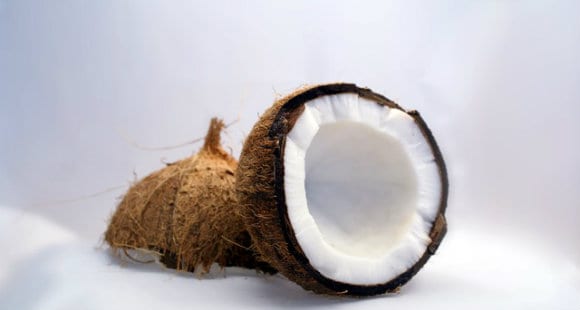
Coconut flour is one of the many “alternative” flours on the market. This flour used to be relegated to health food shops or specialist retailer but is now widely sold and known as a mainstream ingredient. One of the reasons for this is an increased awareness of healthy food options, which makes it more commercially viable for supermarkets to stock nutritious flour alternatives. Another is a rise in the voice of those who must or prefer to eat a gluten-free diet.
So what’s so great about coconut flour, and how does can it maximise your recipes? Here’s our crash course in your new favourite flour:
Coconut Flour Nutrition
Coconuts are very nutritious. Because of this, coconut flour is packed with health-boosting properties. Coconut flour is very high in dietary fibre. This makes it a great digestive aid. Unlike some products made with plain white flour which can lead to bloating, coconut flour actually combats this. It helps the body flush out toxins and waste as it is processed.
The dietary fibre content of coconut flour also makes it great for your cholesterol levels. Eating coconut flour has been proven to help lower your bad cholesterol. This makes it a very appealing to those concerned about their cholesterol and heart health.
Coconut flour is also a source of Medium Chain Fatty Acids. This helps the body to maintain a healthy metabolism. These MCFAs can be quickly used by the body for energy, so they are less likely to turn into fat in the body. You can boost this effect by combining your coconut flour recipes with coconut oil. This will of course compliment the light flavour of the flour as well as including plenty of Medium Chain Triglycerides which also help to boost your metabolism. In doing this, you can ensure that your body is processing energy as efficiently as it can. This is key to ensuring you aren’t missing out on your goals despite putting in work at the gym and in your nutrition.
Coconut flour is also a good source of protein. 1/2 cup of coconut flour is equal to about 8g of protein. This is great news if you are using the flour to make a post-workout snack. It also means that you will feel fuller for longer than if you used regular flour.

Coconut Flour Benefits
Coconut flour has a wide range of benefits. One benefit to consider is that is is very low calorie in comparison to many other flours, including other gluten-free alternatives like almond flour. This makes it a great option for anyone who is looking to make some simple diet swaps to help them lose weight.
Another consideration with coconut flour is the regulating effect it has on blood sugar. Not only does it have a low glycemic index, but it can also lower the glycemic index of food that it is being eaten with. This has an excellent effect on your blood sugar. It provides you with enough energy to be focused and fuelled while preventing a surge and crash of energy.
Coconut flour is very adept at soaking up water. So one of its benefits when baking is that it often creates very moist products.
If you are concerned that the water retaining the quality of coconut will spoil a dish, you can always add a few tablespoons to your normal mix to enjoy some of its nutritional benefits. After all, because it is so dense with nutrients, you do not need massive amounts to start seeing some positive effects in the nutritional content of your dishes.
Carbs In Coconut Flour
There are 32g carbohydrates in 1/2 cup of coconut flour. This makes them a great source of energy, especially as it is slow burning. It is a common myth that carbs have no place in a healthy diet. However, natural carbohydrates are essential for a sustainable and nutritious diet.
This is particularly true when you are working out regularly and need energy sources to fuel your gym time.

Is Coconut Flour Gluten Free?
Yes! Most flours are made from grains, or sometimes nuts. Coconut flour is made from the white meat of the coconut. This meat (the white inside of the coconut) is strained to remove all the water content. Then, it is heated at a low temperature until it dries out and can be powdered into a flour.
Check your flour packaging to ensure it is true coconut flour and only contains coconut as an ingredient. This will mean that the flour is totally gluten-free. Because of this, coconut flour is very popular among Coeliac sufferers, those who follow a Paleo diet and those who have digestive sensitivities. When you see products marked as being made or including coconut flour, make sure you check that it has not been bulked out with other flours if you have an allergy or sensitivity.
As you can see, coconut flour is an ideal option, whatever your dietary needs. Try introducing it into your regular recipes and see if you can tell the difference!
Our articles should be used for informational and educational purposes only and are not intended to be taken as medical advice. If you're concerned, consult a health professional before taking dietary supplements or introducing any major changes to your diet.

Casey Walker is an experienced sports nutrition new product development technologist. He holds a Bachelor of Science in Sports and Exercise Science and a Master of Science in Sports Sciences and Physiology.
Casey’s scientific research area of expertise lies in the effects of dietary nitrates on sprint performance and exercise-induced muscle damage. He has also worked as a sports scientist for a medal-winning Paralympic track cyclist, with a goal of qualifying for the Rio 2016 Paralympics.
Find out more about Casey’s experience here.
In his spare time, Casey is a keen middle-distance runner with an interest in triathlon. He’s always looking out for the latest blends and supplements to improve his half-marathon time and recovery.
Related Articles








